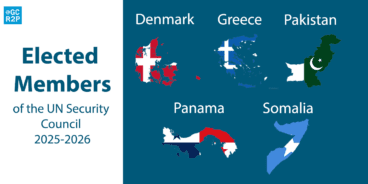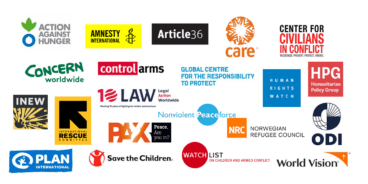
Civil Society Calls for Veto Restraint by UN Security Council
Delivered by Dr. Simon Adams, Executive Director, Global Centre for the Responsibility to Protect, on behalf of: Amnesty International, Global Centre for the Responsibility to Protect, Human Rights Watch, International Federation for Human Rights and the World Federalist Movement.
On behalf of Amnesty International, Human Rights Watch, International Federation for Human Rights, the Global Centre for the Responsibility to Protect, and the World Federalist Movement, I am honored to deliver this short statement.
We thank H.E. Mr. Laurent Fabius, Minister of Foreign Affairs and International Development of France, and H.E. Mr. José Antonio Meade Kuribreña, Secretary for Foreign Affairs of Mexico, for convening today’s important meeting.
In 1945 veto power was conferred upon the five Permanent Members of the Security Council. These states were entrusted with the maintenance of international peace and security and commissioned to discharge these duties “in accordance with the Purposes and Principles” of the United Nations. But it is an unfortunate reality that the veto has sometimes been used, not to defend against “the scourge of war,” or to “reaffirm faith in fundamental human rights,” but to shield perpetrators of mass atrocities from accountability.
In one of the most tragic examples from our times, on four occasions since October 2011 the veto has been exercised by Russia and China to protect the government of the Syrian Arab Republic from resolutions meant to address crimes against humanity and war crimes committed against the Syrian people.
At a time when urgent measures should have been taken to protect civilians in Syria from mass atrocities and to confront perpetrators, regardless of position or affiliation, the Security Council was instead paralyzed regarding a conflict that has now consumed more than 190,000 lives. Those vetoes undermined the legitimacy of the Security Council while the horrendous crimes of the government, as well as some non-state armed groups, continued unabated.
A veto cast against a draft resolution that seeks to end mass atrocity crimes is an abdication of responsibility by a Permanent Member of the Security Council.
This is the context in which we members of international civil society welcome France’s leadership in calling upon the Permanent Members of the Security Council to agree to voluntarily refrain from using the veto in mass atrocity situations of genocide, war crimes, ethnic cleansing and crimes against humanity.
Those who say that the Security Council cannot reform itself, that the politics of cynicism, national interest and narrow opportunism will always win over universal principles, will tell us that this cannot be done. But the need for veto reform is indisputable and support for this initiative is growing.
We respectfully urge all UN member states to impress upon the Permanent Members of the Security Council that they need to live up to their responsibilities and agree to a moratorium on the use of veto in mass atrocity situations. This should happen by the time of the 70th anniversary of the United Nations next year.
Such an initiative cannot undo history, nor correct past injustices, but is an important step in upholding and honoring the UN’s core promise to “we the peoples.”
Related Content


2025-2026 UN Security Council Elections and the Responsibility to Protect
